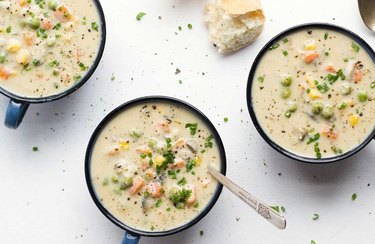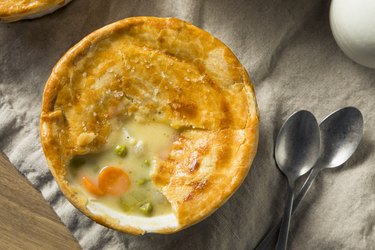
The adage, "good things come in small packages," certainly applies to green peas. They're tiny but a mighty nutritional force.
A cup of cooked green peas has 125 calories and provides 0 grams of fat, 8 grams of protein and 7 grams of fiber. Peas are also packed with vitamin K (20 percent of your Daily Value), folate (15 percent DV), copper (12 percent DV), iron (8 percent DV) and vitamin B6 (7 percent DV).
Video of the Day
Video of the Day
Plus, peas will help you feel more full thanks to their protein and fiber content. In fact, when it comes to feeling satisfied and curbing your appetite, both animal and plant proteins get the job done equally, according to a January 2018 study published in Nutrients.
And get this: A cup of cooked peas has 7 grams of fiber, predominately soluble fiber, which helps keep you regular and can lower cholesterol and blood glucose levels, per the Mayo Clinic.
Peas also have a unique type of fiber called a prebiotic, which means that once consumed, they help promote the growth of probiotics (the good bacteria) in your GI tract. Eating a diet rich in prebiotic foods (such as green peas) has been linked to increased absorption of minerals from other foods, increased protection against colon cancer and overall GI health, according to Monash University.
Now that you've got plenty of reasons to incorporate the veggie into your diet, add these creative green pea recipes to your weekly routine. (Psst, these are nothing like the mushy microwaved peas your grandma used to make.)
1. Yes Peas Smoothie
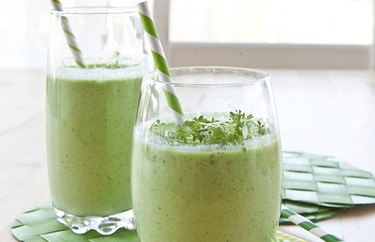
The thought of adding peas to a smoothie might seem criminal, but we promise you'll love this recipe. Paired with light coconut milk, fresh mint and maple syrup, this sip tastes like a creamy mint shake without the artificial colors, flavoring and heaps of added sugars.
There are "3 P's" that our guts love — probiotics, prebiotics and polyphenols, a February 2016 paper published in Gut shares. This smoothie has two out of the three.
Peas, of course, are a prebiotic, but they also offer up polyphenols, which may have antioxidant and anticarcinogenic properties, according to an older August 2012 paper published in the British Journal of Nutrition.
Get the Yes Peas Smoothie recipe and nutrition info here.
2. Mac and Cheese and Peas
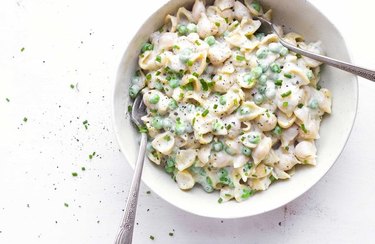
Yes, you can have your mac and cheese without undoing those healthy-eating wins. Adding peas ups your veggie count for the day as well as boosts the fiber, protein and overall nutritional profile of this dish.
This mac and cheese recipe is already nutritionally maximized with the "cheese" being made of cashews, almond milk, spices and nutritional yeast.
You could swap regular pasta for a chickpea pasta to further boost the fiber and protein content in the recipe. These two nutrients go hand in hand with keeping you feeling satiated, as outlined in a February 2015 study published in Trends in Food Science & Technology.
Get the Mac and Cheese and Peas recipe and nutrition info here.
3. Zucchini Noodles With Spinach Pesto and Peas
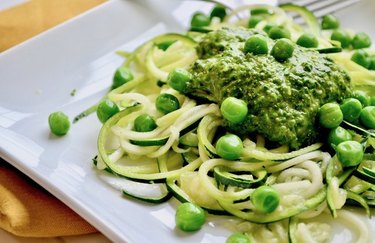
Homemade pesto sounds like it's a heavy lift but this recipe is far from that. This pesto calls for spinach and walnuts (hello, iron and omega-3s) and is vegan, too.
Green peas marry with the crunchy zoodles and rich pesto, adding even more green power to this dish. The green hue comes from lutein, an antioxidant which supports eye health by absorbing the harmful blue light from our screens, as shared by the International Food Information Council Foundation.
Get the Zucchini Noodles With Spinach Pesto and Peas recipe and nutrition info here.
4. Pot Pie Soup
Here's another decadent comfort-dish-made-healthy you'll want to make for dinner tonight.
Gone are the cream-based canned soups and instead, the base is made of vegetable broth and cashews, which makes for a must-try combo that's also dairy- and gluten-free. Plus, all of your favorite pot pie stars — corn, peas, mushrooms and carrots — are still there.
Get the Pot Pie Soup recipe and nutrition info here.
5. Spicy Rainbow Quinoa Buddha Bowl
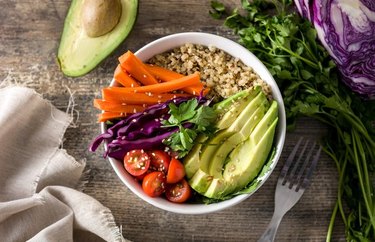
The overcooked green peas of your childhood will be but a faint memory after enjoying this quinoa-based buddha bowl filled with colorful veggies.
The great thing is you can add any veggies (or even fruit) that you have on hand, which is an easy way to use up all the stuff in your fridge and reduce food waste. This tasty combo serves up an impressive 13 grams of fiber and 13 grams of protein for under 350 calories per serving.
Get the Spicy Rainbow Quinoa Buddha Bowl recipe and nutrition info here.
Related Reading
- FoodData Central: "Peas, Green, Cooked, From Frozen, Fat Not Added in Cooking"
- Nutrients: "Protein from Meat or Vegetable Sources in Meals Matched for Fiber Content has Similar Effects on Subjective Appetite Sensations and Energy Intake—A Randomized Acute Cross-Over Meal Test Study"
- Mayo Clinic: "Dietary Fiber: Essential for a Healthy Diet"
- Monash University: "Prebiotic Diet - FAQs"
- Gut: "The Gut Microbiota and Host Health: A New Clinical Frontier"
- British Journal of Nutrition: "Review of the Health Benefits of Peas (Pisum sativum L.)"
- Trends in Food Science & Technology: "Optimising Foods for Satiety"
- International Food Information Council Foundation: "What is Lutein?"
